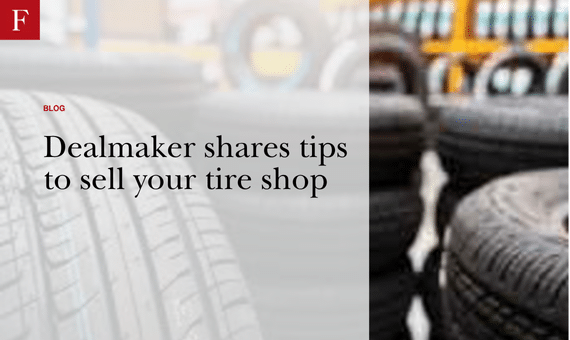
Dealmaker Shares Tips to Sell Your Tire Shop
Dealmaker Shares Tips to Sell Your Tire Shop
When Joseph Tomarchio Jr. and his brother Fred sold their Mr. Tire chain to Monro Inc. in 2004, Joseph didn’t know he would spend the next two decades riding the wave of mergers and acquisitions (M&A) that consolidated U.S. tire dealers.
After closing the deal, Monro executives asked him to join their operation.
Tomarchio figured he would give it six months; he ended up staying for 19 years and worked on over 65 major acquisitions (five stores or more), helping Monro grow from 550 locations to more than 1,300.
Tomarchio retired from Monro in 2023. Now, he’s a senior adviser at FOCUS Investment Banking, where he counsels dealers looking to sell.
The flurry of acquisitions in the industry, fueled by private-equity money, has left a dearth of low-hanging fruit, he said.
Big deals are still made. Mavis Tire Express Service Corp. is in the process of buying TBC Corp.’s Midas International franchise portfolio, with 1,163 stores in the U.S. and another 800 or so in other markets.
In March, Dobbs Tire & Auto Centers Inc. acquired 39 stores in Ohio from Cleveland-based Conrad’s Tire Express & Total Car Care.
Most chains looking to grow, though, will be have to buy smaller dealers (five stores or less) and even standalone shops, Tomarchio said.
“Don’t get me wrong, there’s still companies out there,” he said. “Look, none of us are getting out of this life alive, so unless you got a great succession plan, at some point, you’re going to be looking to divest your company.”
Finding the right match
A successful acquisition starts be- fore the parties reach the table.
Prospective sellers need to keep their books and records in good shape, Tomarchio said. Using generally accepted accounting principles (GAAP) is a plus, but keeping “church and state” separate is more important. “What I mean by that is the sell- er really needs to not use the business as his personal credit card and checkbook,” Tomarchio said. “They need to be separate so that the purchaser can easily wrap his hands around the expenses that are inherent to running the business.”
Tax returns must be up to date with no back taxes, and potential buyers will want to see copies of leases and contracts, purchase pricing details, top SKUs on tires and payroll information.
Also, the building and equipment need to be in decent shape.
“You expect to upgrade some equipment, but you don’t expect to be fixing all the roofs, the parking lots, the garage doors and replacing half the damn equipment in the buildings,” Tomarchio said.
He said he’d rather pay more for a business that’s safe and presentable to customers, than less for one in disrepair.
“Because we know what our expenses are going to be, and there’s no potentially hidden expenses versus the guy that’s got the place all run down,” Tomarchio said. “Be- cause we’re thinking in the back of our head, ‘What else do we not know about?’ ”
And if real estate is being sold, a shop property with environmental issues is a deal killer.
“It’s a deep hole,” Tomarchio said of environmental problems that may include buried fuel tanks and hazardous chemical spills. “You don’t how deep it’s going to be We just don’t want to be involved.”
Sophisticated buyers
Tomarchio didn’t have a lot of experience in M&A before joining Monro. Mr. Tire purchased a handful of shops as the Baltimore, Md.-area chain grew to 26 stores, but Tomarchio described those deals as “very unsophisticated.”
“It wasn’t predicated on EBIT- DA,” he said. “It was really predicated on what my brother and I thought we could do with that location.”
These days, given the size of the companies involved and the number of acquisitions they’ve finalized, buyers are far more sophisticated.
But they need to be transparent, Tomarchio said. Sellers want to know how much they’re going to get for their business and how long it will take to close the deal. That’s why a potential buyer needs to give a seller a comprehensive due diligence list up front rather than ad- dress issues piecemeal.
“Because a lot of sellers, their fear is that it’s going to drag out,” Tomarchio said. “It’s going to get out on the street. Their good employees, potentially, may quit … or have a bad attitude, and so they want to keep it as confidential and under the covers as long as possible.”
The quickest deal he did for Monro was completed in eight weeks, Tomarchio said. Others took longer.
Dealbreakers
Some deals just don’t work out, and then, there are the ones you run from. Besides environmental issues, dishonestly is a huge red flag. Misinterpretations and misunderstandings happen, Tomarchio said, but they shouldn’t become a pattern during the deal-making process.
He advises sellers to tell the truth, even if it hurts, because a good buy- er is going to find the facts anyway
— and never be outright deceptive. Tomarchio said a prospective sell-
er once gave him fraudulent tax returns and financial statements.
“Once you do that, I don’t care if you want to sell us the place for $1, we don’t want it because we don’t trust anything you say,” he said.
Patient but prepared
When dealers decide it’s time to sell, they can’t take their feet off the gas and coast. The first offer that comes along might not be the right one. Selling can take time. Marketing, inventory levels and repairs need to continue as normal.
“Run your business as if you’re never selling, but structure it and put it in position as if you are,” Tomarchio said.
And it doesn’t hurt to have a guide who can handle the minutiae of the process while a seller concentrates on the business, which happens to be Tomarchio’s role with FOCUS.
“It doesn’t have to be us, but I do recommend some senior outside advisement that can help people walk through the minefields, especially when you’re dealing with these (buyers), because they know exactly what they’re doing,” he said.
Previously published on Tire Business.














